#will be naturally borned with sin and suffer
Explore tagged Tumblr posts
Text




Kairos aka patchwork
The Patchwork Lamb: A Dark Origin
Story
Deep within the depths of purgatory, The One Who Waits brooded over his entrapment, endlessly scheming a way to escape the chains binding him. The ancient bishops, each commanding their own domains, had orchestrated their imprisonment, ensuring no mortal could easily challenge their dominion. But the eldritch god, though bound, was not without cunning.
Realizing the futility of relying on mortals born of natural flesh and will, The One Who Waits resolved to create a servant of his own—a being born of defiance, imbued with divine purpose, and unshakable in loyalty. Yet, crafting life from nothing was beyond even his considerable power in this weakened state. Thus, he devised a grim plan: to piece together an avatar of vengeance using remnants of those who had suffered under the rule of the bishops.
The Gathering of Pieces
The One Who Waits reached out through the veil, his whispers echoing across the lands. Lambs, pure of heart and destined for sacrifice, often bore the brunt of the bishops' tyranny. Many met their ends on blood-soaked altars, their remains discarded as mere waste. The One Who Waits called forth scavengers and acolytes who still worshipped in secret, instructing them to gather the scattered remains.
* The Head: From a lamb sacrificed to Leshy, the Bishop of Chaos, came the skull. Its eyes had once burned with rebellion, and even in death, its jaw seemed to clench with resolve.
* The Heart: Torn from a lamb slain by Heket, the Bishop of Plague, the heart pulsed faintly even in death, resisting decay. It belonged to one who had loved their kin so deeply that their soul refused to rest.
* The Limbs: Each limb came from lambs who had tried to flee, hunted down by Kallamar's aquatic abominations. Though taken in despair, their legs carried the swiftness of survivors and the strength of those who refused to surrender.
* The Wool: From Shamura's dominion of knowledge and madness, the wool was collected from the remnants of a lamb who had sought forbidden truths. It shimmered faintly, hinting at an intellect that had peered beyond the veil.
The Ritual of Binding
Once the pieces were gathered, The One Who Waits performed a forbidden ritual within purgatory. With his divine blood, he stitched the pieces together, imbuing the construct with an unholy vitality. He whispered words of power, weaving a fragment of their own essence into the lamb, ensuring absolute devotion.
When the ritual was complete, the Patchwork Lamb opened its eyes, its gaze alight with both the innocence of creation and the malice of vengeance. This lamb was unlike any other—an amalgamation of broken destinies, bound together by the singular purpose of overthrowing the bishops.
A New Herald
Karios existence was an affront to the natural order, a defiance of life and death itself. The bishops, upon sensing its creation, were horrified. It was not merely a mortal; it was a weapon, a living mockery of their dominion and their faith.
The One Who Waits bestowed upon the Lamb a crown of dark power, a symbol of their authority and connection. With it, the Lamb could raise followers, command the dead, and spread their cult across the land. Their patchwork body, though a reminder of their grim origin, became a symbol of resilience and determination to their flock—a testament to the strength found in unity, even when born of broken pieces.
Legacy
Karios journey was one of reclamation. Each bishop it overthrew felt the weight of their sins manifest in this unnatural creature. With every battle won, the Lamb grew stronger, its body adapting and evolving, as if the spirits of the lambs it was made from rejoiced in their vengeance.
And in the end, when the chains of The One Who Waits were finally broken, the Lamb stood as both savior and monster—a being forged not of destiny, but of desperation, vengeance, and divine wrath.
Karios, though constructed from fragments, became whole in purpose: to dismantle the old order and usher in a new age of devotion.
62 notes
·
View notes
Photo

Zagreus
In ancient Greek mythology, Zagreus is a god closely associated with the wine god Dionysus, the underworld, and hunting. A son of Zeus and Persephone, he is known in the Orphic tradition as the first incarnation of Dionysus, whilst other stories identify him as the son of Hades or even as Hades himself.
The earliest mention of Zagreus comes from a quoted line from the lost Greek epic Alcmeonis, a poem dating back to at least the 6th century BCE, where he is described alongside Gaia, the Greek personification of the earth, as "highest of all the gods" (West, 61). Yet some scholars believe this line was only in reference to him being the highest of all the gods of the underworld, as surviving fragments of works written by the Greek tragedy playwright Aeschylus (c. 525 to c. 456 BCE) identify him closely with Hades.
Zagreus is also the name often given to Orphic Dionysus, whose story was central to the beliefs of the followers of Orphism. In the story, Zagreus, a child of Zeus and Persephone, was killed and eaten by the Titans, except for his heart which was found by Athena and brought to Zeus. Because his heart was saved, Zagreus was able to be reincarnated as the god Dionysus. Zeus punished the Titans for their treachery by destroying them with a thunderbolt, and it was from their ashes that humanity was born.
Followers of Orphism, therefore, believed that humanity had a dual nature, one of the body, inherited from the Titans, and one of the soul, or the divine spark inherited from the parts of Zagreus ingested by the Titans. It was the central focus of Orphism for one to achieve salvation through acts of atonement during their lifetime or else be cursed with endless reincarnation. Aspects of Orphism, including the suffering, death, and resurrection of Dionysus Zagreus, and the idea of redemption for an original sin call to mind aspects of later religions, such as Christianity.
Origins & Interpretations
What little is known of Zagreus outside his association with Dionysus comes from fragments of lost works of Greek literature. He was certainly renowned, as a surviving quote from the lost Greek epic Alcmeonis offers a prayer to "Mistress Earth, and Zagreus highest of all the gods" (West, 61). The invocation of his name alongside Mother Earth seems to suggest that Zagreus was held in high esteem and was thought to be very powerful. Some scholars believe that the reference to him as "highest of all the gods" does not claim that he was the greatest god on Mount Olympus, but rather that he was the greatest god of the underworld.
This can be gathered from the context of the prayer, in which the hero of the Alcmeonis, Alcmaon, calls upon the powers of the earth to see the soul of his father safely transferred to heaven. Zagreus' status as a god of the underworld can further be attested to by two works written by Aeschylus. One of these references, found in a fragmented line of one of Aeschylus' lost Sisyphus plays dating back to around the 5th century BCE, identifies Zagreus as the son of Hades. Another reference, from Aeschylus' Egyptians names Zagreus as Hades himself.
Either way, Zagreus seems to have been a powerful underworld god, earning the epithet "Chthonios," or "the subterranean." As for the associations of him to Dionysus, scholars such as Timothy Gantz have postulated that the separate myths of Zagreus, a son of Hades and Persephone, had over time become merged with the myth of Orphic Dionysus, the son of Zeus and Persephone, so that the name Zagreus came to be associated with both myths.
Continue reading...
26 notes
·
View notes
Text
Furina’s title being named after the book of Revelations 17:15 that reads:
“The waters where the prostitute is ruling represent masses of people of every nation and language.”
Is doing the most actually.
#out.#religion cw#religious themes cw#the one referred to as a ‘whore’ for choosing to sleep with the beast#and rejecting heaven and thus those after her#will be naturally borned with sin and suffer#heaven’s wrath as part of the consequence for her actions#the ‘whore’ = furina/focalors#the beast = the water sovereign
13 notes
·
View notes
Note
Rebel please hear me out! Kratos! Reader w/ a twist!
This is an AU I’ve been dreaming of for like a week now. Btw ‘Kratos’ is a nickname Teyvat’s citizens gave the reader, not their actual birth name
Centuries ago, before the Great Archon War was a massacre like no other. All your beloved Archons of today had radically different personalities. Most of them took their divine roles for granted by succumbing to sin. Until one day: The mortals rebelled. They were fed up, but not quite like one bitter soul was.
A being made of flesh with gold flowing through their veins was born. The half blood was the embodiment of humanity’s wrath. They led mankind to war with the Gods. Nearly 2/3 of deities were slaughtered within a year. This was the year the Gods were humbled…..
In the end, Kratos was tragically slain by the hands of their own heavenly parent. That massacre was a painful lesson that present day Archons still follow: Devotion is something that is earned. For someone to be devoted to you, they must have respect and faith that you will lead them in the right direction. Do not abuse the faith others bestow upon you.
To this very day, humans still praise their name. They erected statues in their likeness. Kratos is viewed as a champion of mankind by the mortals, a bittersweet reminder of a shameful period in time for certain for the divine……So get this. In an ironic twist of fate, centuries later, a baby was placed at the doorstep of a cathedral one late night. A baby who was born with very familiar tattoo-like markings on their body.
An Archon, who was spared by that same tortured soul, was now cradling the tiny babbling creature. “Oh. My. Heavens. H-how!? Do you remember me, Little One? I am deeply regretful for the suffering we caused. Please, can we start anew? A fresh beginning for all of us.”
Sincerely, 🌩️ Anon
🌩️ ANON IM SO SORRY I DIED ON YOU 😭😭😭😭😭😭
But holy cow this is a good narrative. I 100% love this! Definitely gets the brain juices going for sure 👀👀👀👀
Kratos being a mortal ascending to the powers of divinity solely because of their bitter nature and revenge-esque methods is definitely interesting! I might write something (no promises) if I find the motivation in myself :D
Venti having PTSD fr tho—somebody get him a therapist 😔
#genshin sagau#genshin impact sagau#self aware genshin#genshin self aware#sagau x reader#sagau#sagau genshin#yandere sagau#genshin cult au#sagau brainrot#sagau cult au#sagau venti#sagau archons
190 notes
·
View notes
Text
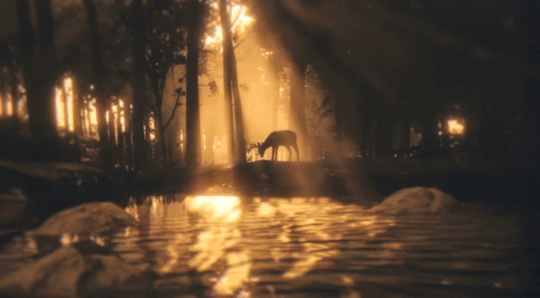
''the morning light, when it comes to me, it was there but I could not see''
Arthur’s life was profoundly shaped by his self-hatred, lack of self-worth and disbelief in the existence of kindness in a seemingly dark and cruel world.
I strongly disagree with the statement that Arthur only became a ‘’better’’ man after being diagnosed with tb. His struggle with his true/inner self is apparent as early as chapter one. ‘’You are not who you think you are, sir… which is lucky’’
He has lived a rough life, raised by criminals and surrounded by violence ever since he was born. It was installed in him early that his value lied within being a violent enforcer and he has lived this life since, knowing nothing else. As a highly aware person, Arthur's actions weight heavy on his soul. He accepts that his actions have consequences. He knows that a person who has caused so much suffering is not meant to have happiness in life. His way of life has caused him to believe that he is not worthy of love or redemption. He doesn’t want to believe that a person like him could be capable of any good. (a thing to note here is that imo, Arthur’s actions near his death weren’t attempts at redemption but rather a strong desire to do right and possibly be his true self.) This is why he keeps living as he does as it’s the only thing he’s ever known, it’s the thing that brings him profit, praise from the person he looks up to and he is already damned so he might as well continue living this life anyway.
The internal problem Arthur faces is that this violent, cruel way of life doesn’t align with what I’d call his true self/ideals. He is torn between the harsh reality he has known and an unconscious yearning for righteousness/love. To be able to carry on with his actions he must enforce certain ideals within himself, such as: I am bad, ugly, nasty, ignorant, mean etc. He also decides to see the dark side of reality, telling himself that the world is a grim dark place and this is just as things were meant to be. This is why he feels so uncomfortable being complimented for his good deeds, because a bad rotten person like him should not be able to do good. It breaks the image he has built for himself and he doesn’t want that happening. This can be seen a lot during the ‘’Money Lending and Other Sins’’ missions where he is unusually mean (even for his standards) to each of the debtors. Imo, he acts this way because he must truly convince himself of being a terrible man to be able to carry out a job which revolts him so badly. In the last debt collecting mission with J. John Weathers, it can be seen in his face/expressions how much he is struggling to put on a tough, uncaring, heartless act. He needs to maintain a ruthless persona to survive in the world he knows. He must convince himself of his own cruelty.
''Forgive me, but that's the problem. You don't know you.''
Contrary to Arthur’s beliefs, he is a naturally kind-hearted person who is unconsciously drawn towards kindness. And yes, even before he was diagnosed with tb. This can be seen in the people he respects the most and, in his willingness to help strangers (notice how he often does unnecessary acts of service for total strangers such as: carrying their things, holding out hands etc. even though they had already troubled him). Despite the life he has lived, Arthur does not enjoy violence, he does not enjoy hurting people. He doesn’t want to dominate over others. He thinks mostly about others and not about himself. This fact alone is very telling of his character.
He writes about Charles, a man who he truly respects: ‘’He’s a better man than me. He does not need to think to be good. It comes naturally to him, like right is deep within as opposed to this conflict between GOOD↔EVIL that rages within me.’’ A man who is not struggling with his inner self would not have written this. To me this clearly implies an inner desire to be a better man. He writes about his mentors: ‘’I love Dutch like a father, but in many ways, I love Hosea even more. He’s kind and fair and like a human being. Dutch is something else.’’ Clearly showing a preference for Hosea who is of a more gentle nature and shows genuine kindness. Unsurprisingly, these are the people who see through his dumb/though act and encourage him to drop it.
When he comes across Brother Dorkins for the first time, he writes: ‘’(he)was one of those innocent people who make you feel better about human beings and about yourself a little. Must be odd to see all that goodness in the world. Place always seemed dark and brutal to me.’’ Expressing how he does not see goodness in the world, implying lack of good examples/kindness/good experiences in his life. Yet, the monk leaves an impression and imo, this encounter (seeing genuine goodness) disrupts Arthur’s perception of what the world truly is. ‘’Just as evil begat evil your whole life long, so good may begat good’’ (what strengthens my belief in this, is the following, symbolic scene of Arthur realising the consequences of his actions right after picking up a crucifix. He was aware of them before sure, but is unable to truly ignore them now having seen it right in front of his eyes). If only Arthur was presented with more examples of goodness in his life.
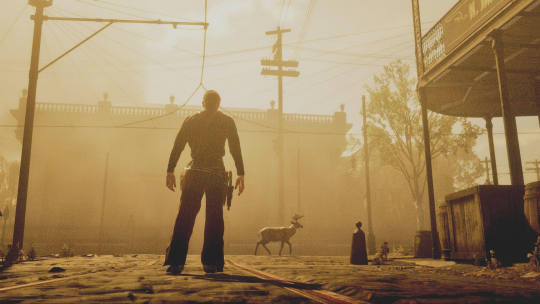
''You have it in you... I can tell!''
His desire to do as much good as possible after realising he won’t live long is instant. This would not be the mindset of someone who did not already possess kindness in his heart. ‘’Know glory and forget about shame.’’ Arthur’s shame and self-loathing caused by his previous actions were what was holding him back from allowing kindness into his life. Knowing that he has limited time left has not made him into someone he wasn’t before. The diagnosis was a catalyst, allowing him to embrace that love/goodness truly does exist and accelerate the process of chipping away from the persona he has made for himself. This was a newfound understanding for him as in the past he was rejecting any notion of kindess. In himself and perhaps the whole existence of it. ‘’You keep hidden all that matters, even from yourself.’’
After being diagnosed, he writes: ‘’What kind of a man have I been? What kind of a man am I? What world is this we live in? A land of fury or a place of love? Am I being prepared for eternal damnation? Am I past any kind of saving? Is that all fairytales? Man ain’t got much good in him. I ain’t got no good in me… I don’t think and yet I see goodness. I see it. If not in me, in good folk. In Abigail and her love for Jack. In that silly monk. In Downes, I guess. Begging not for himself but for the poor, even though he was near starving himself. Maybe I don’t want salvation. Part of me has always longed for death.’’ This entry perfectly shows how deep Arthur’s self-loathing goes and just how much it has damaged him. As his journal allows a look into his true feelings, he truly does not see a single good thing about himself. He knew for a long time that the way he lives is detestable but he could not let go of it. Not because he didn’t want to, but because it’s all that he has ever known. He didn’t believe in anything else. This sudden acceptance of goodness has allowed him to see clearly, which was obscured from him before, and for the first time, enabled him to act free of past regrets for what is right.
⊹ ࣪ ⊹ ࣪ ⊹ ࣪ ⊹ ࣪ ⊹ ࣪ ⊹ ࣪ ⊹ ࣪ ⊹ ࣪ ⊹ ࣪ ⊹ ࣪ ⊹ ࣪ ⊹ ࣪ ⊹ ࣪ ⊹ ࣪ ⊹ ࣪ ⊹ ࣪ ⊹ ࣪ ⊹ ࣪ ⊹ ࣪ ⊹ ࣪ ⊹ ࣪ ⊹ ࣪ ⊹ ࣪ ⊹ ࣪
Arthur’s redemption is not about becoming a good man. It is about finding the strength to change and recognise your true self despite a lifetime of self-loathing and breaking free from destructive beliefs of the past.
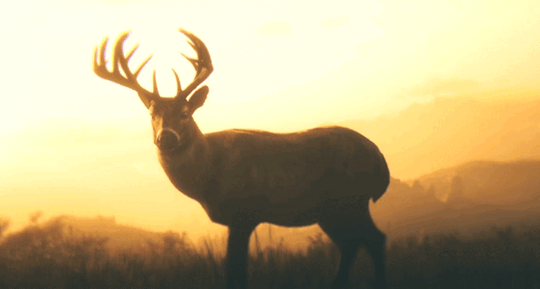
In Arthurian legends a stag is a symbol of the unending quest of spiritual knowledge/enligtenment
#this is my own personal interpretation of arthur's redemption#i could expand so much more on this#the orange quotes are by blind man cassidy#please don’t even interact if you think arthur was just a killer incapable of goodness before he was diagnosed#the ironic thing is that so many people could see behind arthur’s front but he was blind to it#arthur morgan#red dead redemption 2#rdr2#this analysis is based purely on high-honor choices#i don't care if your arthur shoots up entire towns this analysis does not take individual open-world gameplay decisions into account#i did almost cry thinking about this#text post
453 notes
·
View notes
Text
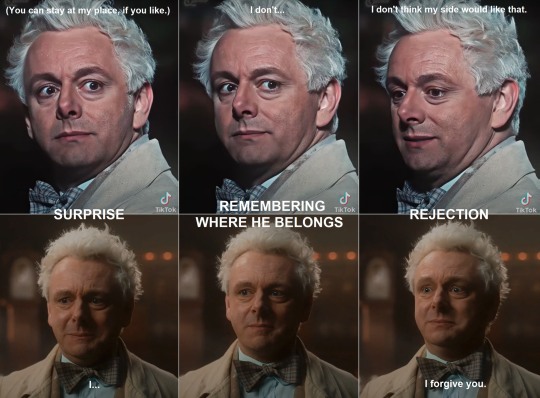
I was not able to find the source for this pic! If you know about it, please let me know in the comments or via direct! Thank you!
Religious trauma in Good Omens: Aziraphale's case
We talk about religious trauma and the state of constant psychological abuse and manipulation experienced by those who suffer it, using Aziraphale as an example.
DISCLAIMER
This post is about painful experiences and the different ways you can react to them. This may affect you in particular and be difficult or stressful to deal with.
Here I intend to speak to you about the trauma of Aziraphale. I use the singular not because it is a single event, but because it is a very specific type of trauma to which ours has been subjected continuously since the beginning of time: religious trauma.
WHAT IS RELIGIOUS TRAUMA
Religious trauma is a complex type of trauma that usually has its greatest impact during the period of development: a person grows up in a social context that is regulated according to the dictates of any sect, which greatly influences the way they approach reality and, above all, themselves.
Often, this trauma begins to affect the existence of the victim even before they begin to speak and thus have the capacity to articulate the memories associated with it. It is not necessarily this trauma that is marked by significant events: very often it is its impact on everyday life that literally conditions the people who experience it, placing them on a well-trodden path of conventions and moral imperatives from which they must not deviate.
We are all (obviously, given the fandom) familiar with the concept of original sin. When a person is brought up with the view that we are all born sinners because we have literally inherited that sin and must spend our lives making amends for what is in our nature, several things happen:
_we live with a constant sense of shame and fear of not making it, of not being enough; _we blindly trust those who raise us and show us the way, and we may not want to see the inherent hypocrisies and contradictions because that would bring us into conflict with reality; _as a result, we have an incredible fear of authority and will tend to respect hierarchies even when they do not make much sense to us, and also try not to question what we are told; _we want at all costs to be 'part of the herd' and conform to the group, so we will suppress anything that we feel is different and might cause us trouble.
Now let's consider that, growing up in such a context, we become aware that something is not quite right for us. It could be anything from realising that we have sexual urges, to being attracted to someone of the same sex, to feeling uncomfortable in our own bodies, and so on.
In response to all of this, we experience feelings of shame, self-loathing and a desire to repress that which takes us away from what is the right way to be.
All these things are cruelly represented in our beloved angel Aziraphale.
AZIRAPHALE'S TRAUMA
It is really difficult to talk about Aziraphale's pain, although it is probably the most obvious and easiest to explain in the series. Because it is tangible, it is realistic, many of us experience it all the time and can relate to it.
Aziraphale has won us over with his almost childlike tenderness and joy, with his tenderness for the little things, with his tendency to take to heart the well-being and happiness of every human being in front of him. He is pure, genuine, sensitive and always on the side of good. But behind his façade of a happy and enthusiastic little creature, there is a frightened, abused, insecure child full of shame and self-reproach. This will always condition his actions and will lead him to the painful and, as we shall see, inevitable epilogue in which he rejects Crowley's love to follow Metatron to Paradise.
TO DO WHAT IS RIGHT OR TO DO WHAT I MUST?
We immediately see how Aziraphale lives in a state of perpetual contradiction due to his strong sense of morality: in the series, the first thing we see of him is the moment when he gives Adam and Eve the flaming sword he received as guardian of the Eastern Gate, so that they would not be completely helpless in their escape from the Garden of Eden.
As well as entertaining Crowley (and winning his immediate admiration), the episode shows us from the outset that Aziraphale has a moral compass that always points in a very precise direction: the good of others. This will often lead him in the series to act on impulse, only to have to face the consequences of constituted authority, and create in him an everlasting sense of remorse: almost immediately he is asked by God himself to account for the sword, the very sword that was in danger of becoming an instrument of destruction in the hands of one of the Horsemen of the Apocalypse - except that it was then the key to preventing it.
Unable to fight his nature, Aziraphale finds himself repeating the same actions over and over again: in the miniseries about the life of Job, his tenacity to save innocent creatures at all costs leads him to confront Crowley head-on, discovering his plan to circumvent the orders he was given and not kill anyone. But the web of lies he and the demon have woven tightens around him as Gabriel, Michael and the other angels descend to give Job the good news that he will be able to have more children in exchange for those who have been killed.
Aziraphale is thus forced to make a choice: tell the truth, exposing Crowley's deception and leading to the presumed murder of Job's children, or lie, saving everyone but tarnishing himself with what he sees as an unforgivable guilt. Our angel, as we know, chooses to lie. This causes him tremendous pain and leads him to believe that his fate is sealed and that he must fall. Despite having made the right choice.
Fortunately, as we know, none of this happens. But the fear of doing the wrong thing is always with him.
NATURAL ENEMIES
Aziraphale never makes it a secret that he despises Crowley's demonic nature. Never.
It is painful to compare the admiring look he gives him in S2E1 when he meets him in his angelic version, intent on starting the nebula he has been working on since the beginning of time, with the veiled look of shock (not to say a little disgust) he gives him in S1E1 when they meet again as an angel and a demon, on the walls of the Garden of Eden.
However, as soon as it starts to rain and Crowley gets close to him, Aziraphale immediately takes him under his wing. Aziraphale is an angel, and as such he loves no matter what. It is his peculiar and almost poisonous trait that leads him to help and to forgive even those who have wronged him.
Aziraphale believes that Crowley should be forgiven and loved, but he cannot accept that he has feelings of love for him. This leads him to reflexively despise himself for what he feels, and to push Crowley away whenever he gets too close: think of the argument under the gazebo, or when, confronted with Crowley's suggestion that he take him for a ride after giving him the thermos of holy water, he tells him that he "runs too fast".
It is already obvious to us viewers, and to Aziraphale himself, that he has feelings for Crowley that go far beyond camaraderie, but he cannot let go of them: the fear of retribution and the contempt he feels for anything that is not angelic leads him once again to flounder in contradictions and adopt that yo-yo attitude that characterises all his interactions with Crowley.
THE FINAL TEMPTATION
Crowley is a demon sui generis: he is not really evil and does not mind harming others. In fact, if he can, he actively avoids doing so. However, he does enjoy temptation, and one of his favourite targets is our beloved angel. Still during the miniseries on the life of Job, we see Crowley's first successful temptation of Aziraphale: while the two are patiently waiting for the storm to pass in the cellar of the mansion, Crowley offers him a drink, but Aziraphale refuses, not wanting to succumb to the intoxication of the wine.
Crowley then suggests that he try some human food. The angel is initially disgusted, but makes no objection, and is so impressed by what he tastes that he devours the entire roast beef on the table. Crowley is delighted, and this gag of temptation for an invitation to dinner is repeated throughout the series. Whether the invitation comes from him or from Crowley, each time Aziraphale eats contentedly and our demon watches him eat with satisfaction.
Crowley can therefore be said to be initiating Aziraphale into the pleasures of the flesh, which he will indulge in to the fullest. Aziraphale is a hedonist who loves refined and special things: from antique books to bespoke clothing, passing records, tea and sushi. He loves the objects he surrounds himself with and treats them with care: remember the white gloves he wears before leafing through the only existing copy of Agnes Nutter's Prophecies!
Aziraphale delights in touching his surroundings, and we have already talked about how his predominant love language is physical contact. As much as he can control himself, he touches our demon every time he gets his hands on him. He cannot help it. He desires it, and while Aziraphale has not realised this for the better part of 6,000 years on Earth, in the last century he has come to acknowledge it openly.
This leads Aziraphale to experience another contradiction: he wants to have more physical contact with Crowley, but he cannot. Crowley is a demon, he is the enemy, he is everything he abhors, but the angel he was is always there, alive, before his eyes, and it is out of love for that angel that Aziraphale accepts Metatron's proposal, faced with the prospect of being able to take Crowley back to Paradise with him. So they could be together, in the sunlight, with the approval of God and all, in an angelic way.
But Crowley unexpectedly, desperately, refuses.
Our angel feels betrayed, but has no choice but to accept Crowley's will.
Here is the irreparable, the ultimate temptation our demon could offer: a kiss, a last desperate cry for love, a plea for help, a series of meanings too great to be expressed in words. Crowley grabs Aziraphale by the lapels and for a few very long seconds their lips meet.
Aziraphale has never experienced anything like this before (probably not even Crowley) and feelings stir inside him that he has never even been able to name. Feelings that frighten him, feelings that bring back his contempt for himself and his being far from angelic nature. Aziraphale desires Crowley, discovers that he wants to be kissed by a demon (as the writers of the show themselves have revealed to us), and all of this clashes with everything he has ever been. He has just witnessed the contempt of angels and demons for the love of Beelzebub and Gabriel, he has just risked extinction for helping the fugitive Archangel, and yet Crowley tempts him with a sweet and terrible kiss.
But Aziraphale is an angel, and as such he loves and forgives.
So he forgives Crowley.
But Crowley, by definition, is unforgivable: disappointed and embittered by his beloved's rejection, he leaves.
Aziraphale does not really want to go to Paradise, but his desire to be part of the herd, his need to be loved and accepted by his faction, drives him to go, to do what is right, what is expected of him as an angel.
As he gets into the lift and asks Metatron what his task will be, he discovers that he will have to deal with the very thing he had already averted in the past: the Second Coming, the Last Judgement. He realises his mistake, realises that he is trapped, and once again wonders if he should do what is right or what he must do.
This time, however, it wins what he must: after one last look at Crowley, watching from afar, Aziraphale climbs into the lift with Metatron that will take him to Paradise. His trauma is so deep and ingrained that it has removed any prospect of being worthy of love except in the light of divine approval.
Although leaving everything he loves - Crowley, Earth, the Library - causes him enormous pain, Aziraphale must return to Paradise and fulfil his destiny.
More infos at Religious trauma syndrome - Wikipedia
Read this post on AO3
Subscribe to my series: The Nice and Accurate Good Omens Analysis and The Science behind Good Omens
Find me on Facebook
#good omens#good omens s1#good omens s1 spoilers#good omens s2#good omens s2 spoilers#good omens analysis#good omens fandom#good omens brainrot#ineffable husbands#aziracrow#trauma#religious trauma#aziraphale loves crowley#aziraphale x crowley#aziraphale good omens#crowley x arizaphale#crowley good omens#aj crowley
103 notes
·
View notes
Note
Hey hey hey - 🦭
Can you do an Alpha Larissa X Pregnant Omega Reader. Where reader is pregnant with twins one a boy, and the other is girl. And Larissa is proud like a peacock, that she managed to give her mate and wife a litter of two pups when her family was known not to conceive a litter. ( for more that 4 generations they never managed to have litters in their family, and reader broke the curse. )
Babies then are born and Larissa is shocked when her pups are both born with white hair just like hers. Larissa cries to reader in happiness and reader is laughing and showing her family through camera another generation curse broken. ( white hair is very hard for Larissa’s family to conceive, but that genetic inheritance has been shown through generations before it stopped and miraculously Larissa was born with it and now her pups have it. ( Which is a miracle for Larissa’s family.) both families jokingly saying that reader is a miracle worker.
Hope you have a nice weekend Mars!
Blessings
*Authors note~ we interrupt sinful souls for a little fluffy Larissa fic🥹 enjoy y’all I’m burnt out with school work and this little fic is what I managed to create*
Trigger warnings~ pregnancy? Birth? Omegaverse
Prompt~ see ask^^^
•••••••••••••••••••••••••••••••••••••••••••••••
Life with your Alpha is more than you could’ve ever dreamed off, you remember how she found you suffering alone through your first heat, how scared she was to not be able to help. With your past and how Omegas are treated you couldn’t tolerate touch of any kind especially in heat. Your pained whimpers and whines of fear whenever an Alpha was in close proximity to you broke the blondes heart. It was then she realised, you were destined to be her Omega. She didn’t get this way with any of the other Omega staff, just you.
With time and effort from both of you, your Omega called for her to help during your heat about a year later. Now being your Alpha and girlfriend Larissa did everything and anything to ensure your comfort and safety. Time is a great healer of wounds, and with Larissa by your side you finally got to heal. Heat after heat she proved to you she’d be here in whatever way you need and want her. Happy to just cuddle and scent you into a little moment of peace or to give into her wolf and take her Omega.
The little test with the bright blue lines sat on her desk as she went to make her morning tea. After your previous heat, you’d noticed you felt a little differently, some of the older Omega students even noting your scent was off, so naturally you panicked and well. You’re pregnant. It’s not something you’d planned for right now but with that little blue plus starring right at you, you knew that this was the perfect time.
To say Larissa was extatic would’ve been an understatement, the moment she saw that test, you became the most fragile diamond in the world. Larissa always had to be touching you at all times. And when your stomach started to swell? Well, she was always rubbing and holding your stomach as you leant your weight on her. Introducing you as her gorgeous wife to be. She made sure you got every craving, she was there for every appointment, bout of sickness and even the false contractions.
Giving birth that night will forever be a memory. A perfect prince entered the world with a little squeaky squeal of protest, absolutely perfect in every way. Itching to hold your new pup until another sharp contraction hit. Something was wrong. You immediately called for your Alpha in fear, instructing her to be with your son despite how exhausted and terrified you were. And just a few minutes later your daughter arrived. “It’s a girl” was all you remember before blacking out.
“Alpha?” You whined coming back to the world, “where’s baby boy?” You mumbled not even being able to open your eyes yet. “Shh my sweet omega, he’s right here with his sister. You did so good my love. A litter of pups. So beautiful” she whispered eyes never leaving the sleeping infants. “Two?!” You mumbled trying to sit up despite the strong aftershocks of giving birth to two babies, “I thought I imagined her.”
Only when you held your daughter in your arms did you finally believe it. You’d given your Alpha a litter. Knowing the family history for Larissa it’s unheard of to have a litter. No wonder Larissa is grinning from ear to ear. Only then did you realise you hadn’t been able to dress the pups in their outfits, thank god for getting one for each gender! Larissa gently taking your daughter as you undressed your son.
“Sweet girl? She-“ happy tears trailed down Larissa’s cheeks as she spotted the Snow White curls on your daughter’s head. Larissa didn’t know where her hair colour came from, no one else living in the family had it, yet here her baby girl was with the same stunning feature. “Alpha” you murmured taking your son’s little hat off to show the same coloured hair. “Y/n! They are perfect. Your perfect. My perfect darling Omgea”, your precious litter completing your family was all so perfect.
Larissa’s aunt couldn’t wait to meet the pups, your family stood with her as they all awaited the new arrivals. Larissa, proud as ever carried both car seats into Nevermore, got you settled on the sofa with both babies in your arm, water in your favourite flask at your side. “Theodore Rodwell James, this is your family baby boy, our sweet prince” you murmured happily allowing your mother to hold her grandson. “And this beauty is Isla Arwen Saige, our little surprise” you murmured before handing her off to Larissa’s aunt. “Auntie look at her hair” Larissa prompted unable to wipe the smug smile off her face. The shock around the room being nothing but a beautiful buzz as both babies were passed around the family and congratulations given to the new mothers.
“Two curses broken, what a little miracle worker you are dear” your mother teased before pressing a sweet kiss on your cheeks. “M sweet girl?” Larissa murmured after taking a seat next you. “Alpha?” Was all you offered as you lulled your head to rest on her shoulder. “My darling omega, thank you for this blessing”
Word count~906
#🦭 anon#anon answered#v3nusxsky answers#fanfic#anon requested#🦭#larrisa weems#principal larissa weems#omegaverse#alpha Larissa Weems#omega reader#larissa weems x reader#weems#principleweemsxreader#weems x reader
211 notes
·
View notes
Text
Bad End: Cultivation

The rope creaked softly, suffering under the weight it was not meant to bear, as it stretched out, seemlingly endless into the mist. This had once been a bridge. The entrance to this lonely place. Humble as it was, the simple rope bridge had once stood for time immemorial. A path of safety above Soul Eater mists below.
Terrible creatures and unspeakable monsters dwelled down there. Things that devoured. Even the mists themselves, were said to drive men mad. Cause hallucinations and aggression. Qi draining in nature. It was like a living thing that digested you slowly.
Unless, of course, you could escape.
Or, it was said, if you were like the legendary immortal who had founded this temple. HE had apparently just walked. Refused the mist's their hold on him. Then climbed the cliff face to this mountain top. I somewhat doubted that tale. But then again, staring down at the rolling mists... it seemed impossible that ANYONE could have ever survived them.
The bridge creaked on, in the soft breeze. There were days it's groans sounded like the cries of a beast in pain. Tortured. When the wind rattled and dragged at what remained of its form. Trying to pull it from it's post. Down, down, down to it's final end.
There was a boot print. Terrible and damning. Cracked, IMPRINTED, deep into the base of the pillar that once held up one side. Far away, the bridge must surely still be stable. Both pillars standing tall, like gaurds. Like brothers. But here?
One powerful kick.
And the bridge had disappeared out from underneath all those that stood upon it.
Everyday... every day I come. Every day I look upon this bridge. Upon the boot, a terrible sin imprinted into stone, and I tell myself I do not recognize the size of it. That my suspicions are wrong. My instincts surely lying. Because... because if I do not?
What can I do? What could I POSSIBLY hope to do? If my suspicions WERE correct? If in this place, lives a monster? I am not stronger them him. Without him, I would be utterly alone. He has insured I am all but dependant on him. Not teaching me how to cook nor clean, farm nor fight. All practical skills are lessons for another day. Forever another day.
Yet...
Yet, I MUST know.
I torture myself with this. The wondering. The questions I do not not ask, for fear he will not even bother hiding behind lies. I stare at the old, long dried blood that stains where the bridge once ended. The shimmering heavenly gold. Somehow... some horrified, gut wrenched, SCREAMING instinct... knows it to be the blood of Tree Fruit.
It is the blood of the unborn. Those that will never get the chance, now. They... they were not even apart of anyone's body. Were wholly seperate, dependent and their protectors for survival. Were FRUIT for God's sake. Just as I had been. Souls reborn, not from flesh, but clean and new, from a Divine Tree. Ascendant from some other place.
I don't know WHY they were taken from the Tree. Why I was. My memory is spotty. It was too soon. I had not forgotten yet. Was not READY yet. It should have been safest to stay there. Be born into the world. Yet... they were on this bridge, instead. Attacked. The blood of infants stains the stones and will never wash clean. I can not... I was still FRUIT, then.
I can not REMEMBER.
And so I come. Again and again, before this rope. That stretchs out into the mists. Above far more terrible things. And try to recall. Make sense of it this terrible thing before me. This bridge. A long, worn, straining rope. With old, well-worn wooden planks, weathered by the ages, that... that hang like bodies.
Strung up in an endless row.
That whisper as they clack and groan with suffering in the wind, "A crime. A crime. Great evil was committed here!"
I tell myself... like a child hiding from monsters they KNOW are real. Trembling and blood soaked, terrified, as they crawl as far back into some small dark place as they can... I... I do not want to compare the boot print in that stone to Lei's. That they would be different sizes, even if I did.
I do not convince myself.
I never do.
"Shimei, this disciple wonderd where you were..." calls out a familiar voice. Deep in the way dangerous waters are deep. Smooth and placid at the surface. With something deadly I can not see, far, far below. "This one has found you at the bridge again. What captivates you so? You missed your morning snack. Should be on your way to early morning meditations."
My smile is more of a grimace, as I turn.
There are days... when forgetting is easy. When the tranquility of this place seeps itself into my bones. The comfort he deliberately arranges for me. The scheduled repetition. It is... trance-like.
Sitting with tea and snacks. Watching the early morning's sunlight dance off the distant mist. As birds wake and dew settles. The world hushed. Cup warm in my hand. Coat dropped over my shoulders. It is beautiful. The meditation garden is beautiful. EVERYTHING here is beautiful.
It is the fact that it is... empty, that bothers me.
This was not a temple built for two people. Remote as it must be in the world. The sect built this place for a reason. And each day that passes? I am more convinced that reason was to have a place to fall back too. The temple is lovely... but more then that? It is a FORTRESS.
Difficulty getting here is not even a fraction of the defens it holds.
So WHY?
WHY are there only two people here?
I nod, stepping towards my "shixong" as he insists I call him, dispite there being just the two of us. His hand reaching out to take my arm, guide me. I no longer need help navigating these halls. But he does not stop. Clings to his excuses to coddle and touch. It is a fight I can not win. I pick my battles. But, before his hand reaches my sleeve. Knife!
A throwing knife, shrieks near silent through the air as it cuts between us. Nearly removing Lei's fingers as it does. I jerk away, startled. He whips around towards the bridge.
"GET AWAY FROM THAT CHILD!"
The voice that roars that command has the distinct rasp of old age. Sure enough, a figure in flowing robes surges forward from the mist, running light as a feather across the single rope that remains of the bridge. Long white hair and beard. A wrinkled face, more accustomed to smiling, now turned into a fierce and determined scowl. The robes of a Grand Master.
There are a handful of warriors following him.
But the one that I can not look away from... it's... it's like looking through the lense of a half forgotten dream. Blurred by angles all wrong. But oh... oh how could I forget that face? The one that stares at me with such fierce and fearful determination?
...Shijie?
More then an older sister, less then a mother. Whisperd promises, muffled by liquid, from long ago. I know that face. KNEW it. It once smiled down at me, as I grew upon my branch, and promised we would be family. Loved me. Beautiful and patient, as she whispered about all the wonders of world.
I was...
Oh.
I was supposed to go with HER.
Be raised by HER. A little sister, a daughter, someone she could guide and grow with. My memories struggle to come together, but faced with familiar faces? They TRY. Especially as power begins to surge around me. Terrible and familiar. The beginnings of a fight.
Someone on my branch. Not my sister. Pale as morning mist and just as untouchable. He seemed lonely. I was lonely. Far from other Fruit, an awkward thing, high up, and on an old twisting branch. That had missed all nipping and cultivation by being accidentally hidden by the leaves surrounding it. The fruit was supposed to grow lower to the ground, where it could be watched. Safe.
But I happened anyway.
And I was alone.
No others to spend my time with. No disciples to come and care for me, day to day. So when the mist man came? I clumsily... reached out. Pat pat. There, there. I'm here, "dude". (I... can not remember what that word meant. But I know I knew it. It was friendly, I think.)
He was surprised to find me, up there.
I don't not think he told anyone.
I...I think he was supposed too?
But it did not matter in the end. Someone else found his hiding spot. Found me. There was much shouting and alarm. Elders, I think. Doctors, to insure I was well. Great relief, that I was a hardly little thing, developing as I should. After that? I had constant visitors. None that seemed very interesting... until... until my Shijie.
They were looking, I think, through interested parties for a match. Who would adopt me. Then there was softness. Sweet, golden days. The mist man visited. Anger from him? Not at me. Displeased. Covetous? I did not understand. Something wrong was growing but I was unborn... did not have a name yet for the sensation.
Just that is was...Dark.
Then it was night time. A beautiful moon through the branches. Smoke, black and terrifying. Screaming and the clash of swords. Unbearable heat, climbing and climbing. Lights blinking out. Dying? Were... were they dying? The great Tree, divine and holy, groaning in agony. Wood popping from heat. Splintering from blows.
Feet upon my branch. Running, running, running. Falling too their knees. Swordsman's hands. Bloody, wrong, not my shijie. Where is my shijie? Sister! SISTER?! I am being pulled. No. No, it is not time. It is too soon. The Fruit is not ready.
The hands do not care.
I am torn out by the roots.
Where the Tree should be... is nothing. I SCREAM. It hurts! A void. The ocean of life gone, gone, GONE! Already I am starving. Destabilizing. Dying again. Scared! Please! I am-!
A hand wraps around the raw nerves of my roots. They are wrong. I know them, but they are WRONG. Where is shijie? Sister... SISTER! Please!! Energy floods back in, as though it never stopped. But... but it is not clean. Like brackish water after so long in clear springs, I choke as I try to adjust.
Moving.
Running.
Where is the Divine Tree? I want to go home.
Others join. Burned. Bleeding. They have Fruit too. I have never been so close to others. They sound nervous too. Scared. But they have their family. Why do I not? There is some plan. A bridge that goes on and on. Below us are terrible things. They are talking? The end in sight.
"-viously you can't... -ep her, she's not your child. Y.. -eat thing protecting her th.. -ll be so relieved you have her child. N.. -all we have to... -ait out this..."
Something ugly is rising. Danger. DANGER. No, no, NO. STOP. Run! Bad thing is coming! I don't-! I can't-! Covetous, terrible, tar-like WRONG! Seeping up like festering! Stop it, stop it, STOP IT!!
The sound of a sword being drawn.
I am tucked close. Cradled like something precious. As a blade sings destruction through the air. A shocked and betrayed cry. Confusion. I can see horror on faces, feel terror from the other Fruit. Two of them are dead. CRUNCH. The bridge violently lists to the side, weight no longer equally supported.
Time seems to slow... as ancient metal slides free of stone.
Half those on the bridge are gone in an instant, as the floor swings out from below them like a trapdoor. Those that remain? Are the souls fast enough to grab the rail that still remains. The boards, as they fall. They hang above certain death, as their friends fall screaming in primal fear, to horrific death below.
How long can they hold on?
Especially with only one hand?
A few already lost their grip on their Fruit in the sudden shift. Can only stare in numb and mind blank horror, soul deep agony, as the bright little lights fall... and fall... and fall...
Inside my Fruit I SCREAM.
I do not remember after that. Only being born. It is a blur of trauma my mind must have refused to keep. D..Damn it. DAMN IT! I jerk away from Lei. I had known. I hadn't WANTED to know... but I had KNOWN.
The Grand Master attacks. His blade crashing like the might of a wrathful god against Lei's. Sending him sliding back. The master pressing his advantage, warriors rushing to fan out between the fighters and me.
Arms. Soft yet unimaginably powerful, the scent of tea and the medicinal flowers she proudly grew for the sect, I was pulled into an embrace. My head tucked against her neck. Arms bordering on too tight. As though I would disappear at any moment.
"Shimei.." my shijie whispered, a wounded sound. "This sister has you. We have come to rescue you. The traitor will never hurt you again. Come!"
This felt right. I nod. Follow her towards the bridge.
"Thief."
Lei's snarls. Never has there been an uglier, more venomous sound. One of the warriors, acting as a shield, dies preventing my sister from being speared through the heart from behind. Desperately, she scoops me up. Breaking into a sprint.
"Do you truely think you can take this one's Disciple from him? His WORLD!?" An unhinged laugh echoed along side the clash on blades. "There is NOWHERE you can hide her, that I will not find! She is MINE! Belongs with ME! You can run but there is NO WHERE you can hide!"
I cling to my sister as she jumps up on the rope, racing away from the gilded cage that was my only home. Over her shoulder, Lei is locked in combat. The ugly something I had always known was there, finally out in the air between us. Demonic energy spilled from him like radiation. Sickening and every bit as caustic. His eyes wild as they lock onto me.
"I'm going to BURN everything that gets in my way, my disciple." He croons, the grin spreading across his face a thing that will haunt me. "Just like before. NOTHING will keep you away from me. Nothing! I am going to hunt you down, drag you to ascension, then spend the rest of time making you MINE."
"And nothing will stop me, child. Not even you. Why?"
"Because I LOVE You."
#threepandas#yandere#yandere x reader#reader insert#yanblr#yanderecore#bad end cultivation#bad end cultivation au#immortal cultivation#not a genre i have tried before but i wanted to branch out#and i like long hair#platonic yandere#or not!#you can decide with this one#long reads#long post#tw infant death#the Fruit are technically infants#tw dark themes#cause she KNOWS but is not certain til the end
92 notes
·
View notes
Text
Rahu Dominant Themes — 𝐍𝐚𝐤𝐬𝐡𝐚𝐭𝐫𝐚 𝐎𝐛𝐬𝐞𝐫𝐯𝐚𝐭𝐢𝐨𝐧 𝐒𝐞𝐫𝐢𝐞𝐬 (part 2 of) 𝐩𝐚𝐫𝐭 𝟕
warning ⚠️: suicide, death, movie spoilers!
All the Rahu nakshatras are ruled by deities related to the weather. Rudra (Ardra), being god of roaring storms. Vayu (Swati), being god of wind. Varuna (Shatabhisha), being god of the seas & sky. This validating the volatile nature of these nakshatras, explaining why they get a reputation of being unstable and emotional in tropical astrology being cast as water signs.
The story of Vayu's son being struck by Indra's weapon and Vayu wishing to cause harm to all his subjects shows the intensity of Swati. Lord Vayu lives inside all creatures. So when his son was severely injured, his rage grew as no one batted an eye, his fury making all worlds start to feel like hell. Creating unhappiness in all lives. Even the gods were miserable, constantly hoping for some sliver of contentment back. Swati is where desire is born from a state of misery and lack. Vayu's rage translated in everybody's affliction. Their punishment being in a cycle of desiring and suffering. Being that Rahu is constantly dissatisfied, chasing things he might never attain, or attaining desired things which never fulfill the heart, we see how it's perfectly expressed with Vayu through Swati. And Vayu himself, representing the rage of injustice in the world and causing obstruction through Swati as I briefly touched on in the first post.
About justice and morality, which I see in the other nakshatras. In relation to Rudra's story: Lord Brahma, the Creator of all creations, was harassing his own daughter (who he created directly from his semen), Saraswati, continuously pushing his sexual advances on her even as she ran away. He sprouted five heads in search for her when she disappeared from his sight. And immediately, Lord Rudra cut off the root of his heads. He condemned him for his incestuous actions and decided that there will be no proper way for anyone to worship him as he is unholy. Brahma was ostracized. Ever since that incident, Brahma has been reciting the four Vedas as a way to repent. Rudra being righteous in the story, cutting what is so clearly wrong and sinful. From that, we can see how this manifests through Ardra as I touched on in the first post.
Then Lord Varuna, ruling over Shatabhisha, is the guardian of moral law. He punishes sinners by binding them with his famous noose which is in the form of a snake. His name can be derived from the Sanskrit root which means 'to surround' or 'to bind'. This referencing the rivers and ocean surrounding the world which are ruled by him and him binding sinners in justice. Varuna plays a crucial role in framing your principles, values and beliefs & religiously operating from them.
Despite these deities literally being deities and natives with these nakshatras just being human, we can still see how there can be righteousness expressed through them in many ways. And fighting/advocating for what's right in a sinful society. A lot of advocates I found have other recurring nakshatras such as Uttara/Purva Ashada, Uttara/Purva Bhadrapada, Revati, Hasta, and Ketu nakshatras. And among the list are also Rahu nakshatras or Rahu influence.
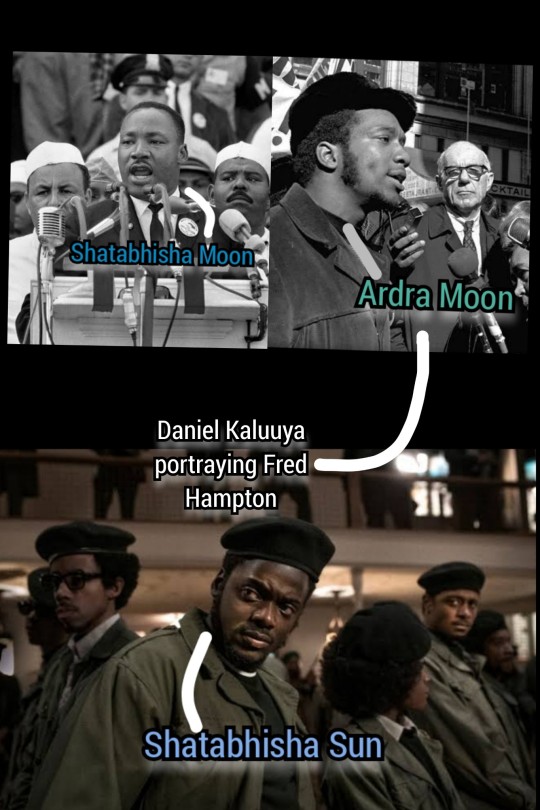
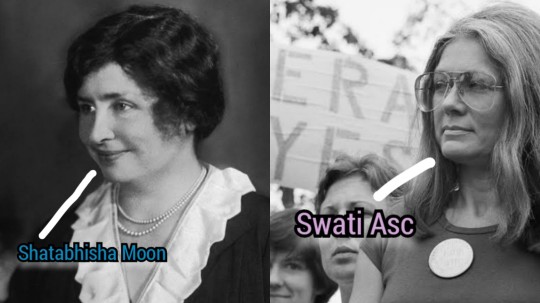
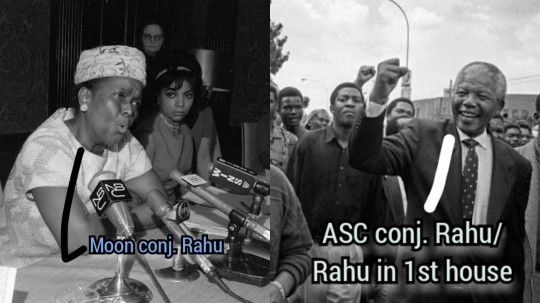
Some examples above of important activist figures who fought societal inequities and inhuman laws in history with Rahu nakshatra/prominent Rahu influence.
Endless desire being birthed from dissatisfaction is a theme also found in Ardra. And that is because of Rudra. Rudra was created from between Brahma's eyebrows as a result of his anger which was triggered by his ignorant passion. The Bhagavad-gītā scriptures describe the essence of Rudra in such a way: Krodha (fury/rage) is the product of kāma (desire/lust), which is the result of ignorant and egocentric passion. It is when the desiring is unsatisfied that rage is born. This causes one to become enslaved by their senses, the material world, and their desires. Such themes manifest through Ardra, which forms a powerful axis with Mula. Mula which kills all desire and ego as it recognizes it as the root of all evil. Mula, who is ruled by the deity Nirrti, who is also known as the ferocious Goddess Kali - slayer of men! Kali grants liberation by removing the illusion of the ego. Emphasizing that we are the eternal I AM and not the body. Goddess Kali is a manifestation of Rudra/Shiva. Though, they oppose one another. Both being ferocious, they are still at two opposite ends of the spectrum. Rudra's rage being driven by desire and the ignorant ego, Kali's rage destroying desire and ego. The two deities ruling the two nakshatras which are at opposite axis of each other, being perfectly paired with the representative shadow planets Rahu and Ketu, which is so fitting.
The most perfect media story that represent these respective energies is the Turkish drama called Aşk-ı Memnu. In which the female lead is played by a Mula Moon and the male lead is played by an Ardra Moon (with a Swati Sun). And the Latin telenovela version of it, Pasión Prohibida, in which the female lead is also played by Mula Moon and the male lead is played by an Ardra Moon again!
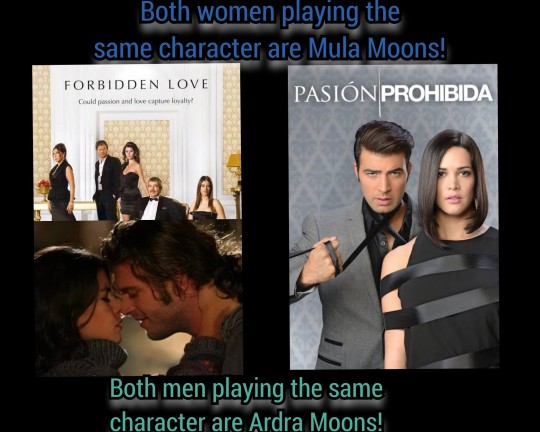
The male character in this forbidden love story starts to lust after his uncle's newly wife and eventually she ends up desiring him as well. They both give into their desire and start to have a secret affair which leads to them falling for each other. Their sinful/lustful relationship leads them to misery. The male character, being Ardra, ends up feeling wrongful and rejects her when she proposes them to run away together. She even plans on divorcing his uncle in order to be with him, but now he's choosing to run on a false/illusory moral compass "doing the right thing" (yet he's still hiding the truth from his uncle). Her, being Mula, acknowledges they're in love and is willing to expose everything for them to be together (Ketu being unrealistic and irrational). She realizes her attempts at convincing him are futile, and she ends up killing herself on the day of his wedding to another woman and their affair gets exposed to everyone. She did this knowing it will bring him his very own death. He dies too, figuratively. On the finale, both soap operas show how he is left with absolutely nothing in the world. This being the works of Kali through Mula, killing him and draining him of everything. Because it all started with the Ardra character, he initiated the affair and pushed his lustful advances on her. Rudra, desiring and lusting, only creating his own downfall. So perfectly shown in these soap operas.
Now, Rudra can be the destroyer of desires as well. As he creates misery, he can destroy it. He is the Destroyer, and he acts as a healer. Rudra literally means "one who destroys all problems from their roots", which emphasizes the power of self-liberation. Emphasizing the self-power Rudra holds! And just like Vayu was the bringer of unhappiness, he is also the ones who breathes life and happiness into all living things as well. This shows the dualistic nature in Swati and Ardra, and the power these nakshatras holds.
There seems to be an understanding in self-creation and manifestation in all three of the nakshatras. Vayu is the breather of life and happiness, but also the bringer of misery and death. Rudra is the creator and destroyer of illusions. Varuna being the king of the universe. It's very interesting to find manifestation themes in films that have some Rahu and Rahu nakshatras roles playing around them. Such as the film 13 Going On 30.
13-year-old Jenna, played by Christa B. Allen who has Moon conjunct Rahu, wishes on her birthday to be a successful, beautiful, charismatic 30-year-old version of herself.
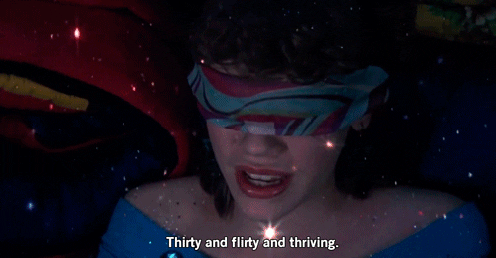
And her wish comes true as she wakes up as her desired version, played by Ardra Ascendent Jennifer Garner.
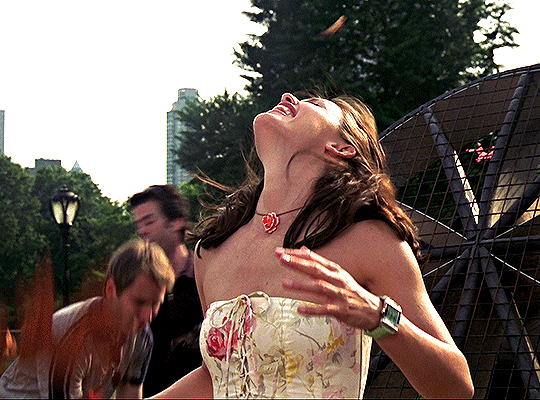
And the film 16 Wishes directed by Swati Sun, Peter DeLuise. A teenage girl has created a list of things she wishes to happen on her 16th birthday and everything manifests exactly the way she wanted.
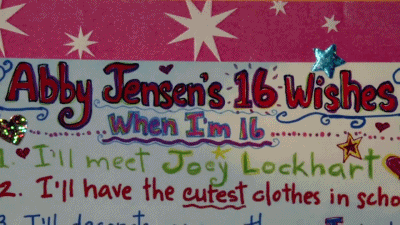
Both stories show the dissatisfaction experienced by the main characters with their manifested desires, which perfectly shows the nature of Rahu. After getting everything they wished for, they still want to go back to the way things used to be before.
Interestingly, the theme of 'trapped in a movie' is something that I found related with Rahu influence. For example, the film The Final Girls is about a young girl, who just lost her mom, getting teleported into a movie starring her mother. The actress playing the young girl is Taissa Farmiga, who has her Moon Rashi Lord in Swati and her Atmakaraka planet in Shatabhisha. And the film is made by Todd Strauss-Schulson who is an Ardra Sun and Swati Moon.

Also, The Truman Show, starring Swati ASC Jim Carrey, who plays a insurance salesman who is oblivious to the fact that his entire life is a TV show watched by the entire world, that everybody around him is an actor — everything around him is a fake simulation.

Then, there these two kdramas, titled "W" and "Extraordinary You". In W, a young woman teleports into a famous web comicbook which was written by her father and meets the main character whom she falls in love with, later realizing that she was the one who created him from a childhood drawing (which her father took inspiration from). He comes to the truth of his nature as a 2D-character and decides to take control of his own destiny from the writer. He is played by Lee Jong-Suk, who is a Shatabhisha Moon. And his love interest who indirectly created him is played by Han Hyo-Joo who is a Shatabhisha Sun.

Then, in Extraordinary You, a high school student realizes on her own that her reality is not real. And she then discovers that she is not only in a comicbook, but she is a background character in which her doomed destiny is decided by the writer. She attempts to change that, wanting to fulfill her desires (Rahu) and dreams of love. She is played by Kim Hye-yoon, who is a Swati Moon. And another character who comes to the realization of the unreality of things (and that he never had a choice in his identity) is played by Lee Jae-wook, who is also a Swati Moon.
Rahu is very much material-world-based, as everything that drives it is purely based on ego and all things of the five senses. It's outwardly chasing, engaging with the world purely on changing it, and attaining desires. Rahu represents the modern-world. Hustle culture, hook-up culture, productivity, transactional relationships, to-do lists, politics, activism etc. All these things that are a part of the human ego's world. It feels real because it's all happening to your ego. But Ketu kills the ego, thus killing the illusions (the world surrounding the ego), and Rahu drives the ego, thus upholding the illusion around it. I mention this very obvious observation as a way to connect all the mentioned films above.
Although it'd be very fitting for Ketu to be the one who awakens you first from the illusions, it is actually Rahu. The films 13 Going On 30 and 16 Wishes showcasing one's attainment of their desires being very unfulfilling and even wanting things to go back to normal - thus appreciating the things you took for granted. It could even go so far as to deciding to walk a spiritual path from all the resulted emptiness from material things. Then that's where Ketu 'welcomes' you.
The very unreality of the world we live in is incredibly Rahuvian, especially the discovery that you were 'never really human' but merely a character. This theme, from a Ketu perspective, suggests that you are Consciousness, and you fooled yourself into believing you were a mere human because of how the world (Rahu) appeared to be so real to your human mind. So "you got lost in the sauce". And the identity you think you are is as unreal as the world, it's all an illusion. Ketu challenges, "If not the body, if not the thoughts, if not the story you've been told, if not the emotions, who am I?" Rahu cannot answer. Rahu can only showcase the unreality of things, such as the Rahu-influenced kdramas I mentioned above; "W" and "Extraordinary You". It is Rahu that causes illusions, and waits for you to break the illusions.
One theme I found interesting and noteworthy which has Rahu/Ketu influence is body swapping. Popular films I found carrying this concept of people's 'souls' switching bodies have an underlying message of understanding someone else by literally walking in their shoes. And also valuing the life you had before, being grateful for what you took for granted, and having a better understanding of other people. The understanding that no one's life, no matter how flashy and stunning it seems, is really perfect or worthy to put on a pedestal. This understanding being mostly showcased in films such as 'The Change-Up' and 'Freaky Friday'.
In Change-Up, two best friends have polarizing lifestyles. One is a busy lawyer who is a responsible father and husband. And the other is an actor who is still a free, bachelor playboy. Both desire each other's lives and a body swap happens, which has them realizing how challenging it is to be each other. Now they want to revert back to their original lives, now valuing what they took for granted. It stars Ryan Reynolds, Swati Moon, and Jason Bateman who has Mars in Swati. In Freaky Friday, a mother and daughter who don't understand each other at all end up body swapping and they learn things they never knew from experiencing each other's lives, which heals their relationship. The film stars Lindsey Lohan who is an Ardra Sun and Jamie Lee Curtis who is Mula ASC.
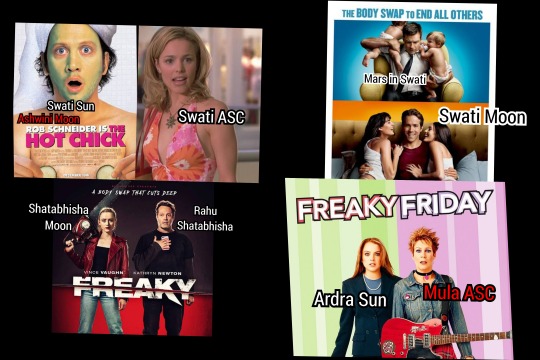
Then the two films you see on the left are about two pretty teenage girls swapping bodies with unattractive looking, greasy criminals (one a robber, another a murderer). Comedies showing how ludicrous it is for greasy looking, middle-aged, white men to have the soul of a teenage girl, though the movies do show the beautiful bond between friends who can recognize each other even if they were in another body. This likely playing into 7th house and 11th house themes as Hot Chick stars Swati/Libra natives, Rob Schneider & Rachel McAdams. And Freaky starring Shatabhisha/Aquarius natives, Vince Vaughen and Kathryn Newton. (As shown in the visual)
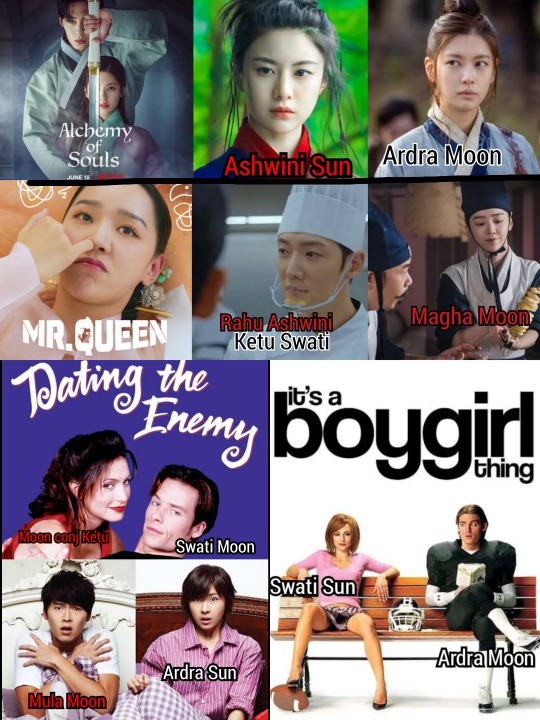
Here are more examples of body swapping movies/tv shows shown above: "Alchemy of Souls (season one)", "Mr Queen", "It's A Boy Girl Thing", "Dating The Enemy", "Secret Garden".
Thank you so much for ending here! Now, onto preparing the next post like this about ketu 🫠 byeeeee.
#ardra#swati#shatabhisha#rahu#rahu nakshatras#nakshatra series#ketu#mula#astrology#vedic astrology#sidereal astrology#vedic observation#sidereal observation#astro observations#astrology observations#sidereal observations#vedic observations#Gemini#Libra#Aquarius#Sagittarius
403 notes
·
View notes
Text
raw lines from a variety of sources ... sentence starters
"Then perish."
"Pick a god and pray."
"Even fate picks its favorites."
"Everything happens so much."
"I pity the fool that lives like you."
"Then become the dirt I walk on."
“Confidence is quiet. You’re not.”
"I am a monument to all your sins."
“You said I killed you. Haunt me, then!”
“Do I look like the kind of man who dies?“
"You cannot kill me in a way that matters."
"If you want me to die you can just say so."
"Violence for violence is the rule of beasts."
"Your secrets are safe with my indifference."
"Will you fight? Or will you perish like a dog?"
"We might be in the history God abandoned."
"I will face God and walk backwards into hell."
"I can’t go to Hell. I’m all out of vacation days."
"The light inside me is broken, but I still work."
"Don't leave me, dear. Haunt me like a memory."
"I commend my soul to any god that can find it."
“I have been through hell and come out singing.”
"I will die on this hill before I bend on this matter."
"You are strong, child. But I am beyond strength."
"If there can be no victory, then I will fight forever."
"I cannot hold back the tide of your bad decisions."
“What an exhausting thing it is to be called a hero.“
"To become God is the loneliest achievement of all."
"You cannot condemn those who build your throne."
"No cause is lost as long as one fool is left to fight for it."
"You kneel before my throne unaware it was built on lies."
"My ancestors are smiling on me. Can you say the same?"
"If God wanted you to live, he would not have created me."
“Love is like ghosts; Few have seen it, but everybody talks.”
“I had all and then most of you, some and now none of you.”
“I hope you heal from the things no one ever apologized for.“
"If you should ever get to heaven, I’ll be there to make it hell."
"No one will know the violence it took to become this gentle."
"You either die a hero or live long enough to become a villain."
"God has cursed me for my hubris and my work is never finished."
"Kill me and live with the memory. Then tell the stars that you’ve won."
"There’s no point in being grown up if you can’t act childish at times."
"You could sooner divert a river from its course than deny my nature."
"We both stared into the abyss, but when it looked back… you blinked."
"I will seize destiny by the throat and force it into the shape of my choosing."
"The anger in your heart warms you now, but will leave you cold in your grave."
"I survived because the fire inside me burned brighter than the fire around me."
"If the world chooses to become my enemy, I will fight just like I always have."
"Do you think God lives in heaven because he, too, fears what he has created?"
"I forgive but I will never, ever forget. Don’t mistake my kindness for gullibility."
“Someday you will have to answer for your actions, and god may not be so merciful.”
"What is better? To be born good, or to overcome your evil nature through great effort?"
“You are alone, child. There is only darkness for you, and only death for your people.”
"You took a pure and beautiful thing, and you beat out everything good, to suit your ends."
"We all make mistakes. That’s what happens when you’re brave enough to make decisions."
“I am not responsible for actions of the imaginary version of me you have inside your head.“
"I think we deserve a soft epilogue, my love. We are good people and we’ve suffered enough."
“They dropped the world on your shoulders and called you Atlas. How long can you hold the weight?”
"I’ve heard it said that we only gain wisdom through suffering. And tonight I intend to make you very wise."
"Stand in the ashes of a thousand dead souls and ask the ghosts if honor matters. Their silence is your answer."
"The world should have protected you, but you have been asked to protect it. What an honor. What an injustice."
"Across all worlds, all times, no matter what you do or what you become: You are nothing less than beautiful."
"The bar was so low it was practically an tripping hazard in hell… yet here you are, limbo dancing with the devil."
"What can one do in the face of such monumental loss but breathe a weary sigh, for the world is a little quieter now."
"I hear your questions constantly. They come to me in my dreams like a prophet receiving visions from an angry god."
"I see now that the circumstances of one’s birth are irrelevant; it is what you do with the gift of life that determines who you are."
"Too many people have opinions on things they know nothing about. And the more ignorant they are, the more opinions they have."
"Always remember that the crowd that applauds your coronation is the same crowd that will applaud your beheading. People like a show."
"One day, you will be face to face with whatever saw fit to let you exist in the universe, and you will have to justify the space you’ve filled."
363 notes
·
View notes
Text
brosca is the only one who will ever see Duncan as a savior, at the end of the war.
you’re a human noble. you’re a proud, happy member of house cousland. when howe betrays your family and you’re there, terrified, in the cellar with the shattered remains of your dying family, it’s you and your mother against the world. your mother: the pain-in-the-ass, hardheaded, spitfire of a woman that sassed you yesterday about manners is beside you, her eyes haggard and haunted. “He’s my husband,” she says, begging, like it’s the easiest thing in the world. “He’s your father, and he’s dying, and I love him. Whatever he faces next, he faces it with me.”
She cannot be argued with. She cannot be reasoned with. You can beg and beg and beg your mama to come with you, to survive beside you, but the outcome will always be the same. Duncan will ask you to leave, and she will choose to stay. How can you live with that?
(It’s poetic justice, perhaps, how quickly you come to understand it.)
—-
You are a dwarven princess, beloved of the house aeducan, noble of caste and certain of birthright, when your brother betrays you.
Not the brother you expected to betray you, of course. Your bosom friend, your sovereign sibling. The one who would’ve had your back eternally, if the wide expanse of the throne hadn’t stood in the way. If only love could’ve bridged the chasm. the warden bridges what Trian could not, what Bhelen would not - a last-minute pardon, excusing you from a game you never knew you were playing.
(you had a birthright, certainly, and it was taken from you. all else you cling to is stolen valor now.
checkmate.)
—-
You are the young bride tabris, and your husband stands there bleeding.
Your cousin has already been stolen away, and it hurts, how innocent she was, when so much of you had been stolen away. You would’ve stood in her place a thousand times, and all the evil, lecherous, unspeakably human hands in the world wouldn’t have stopped you, if it meant shielding Shianni. Your husband, bright-eyed and already dying, even if he knows it not, comes to save you. He does not know you, but he saves you from horrors that you have braced against a thousand times before, before he knew you, even if it does not matter. he is noble, in that way.
Duncan is noble too. He offers you a way out - a way out from your family, from your friends, from the only world you have ever - could ever - know. he offers you a chance to die on the battlefield instead of dying in the cellar, before you would ever know this suffering, the suffering laid on you at birth, by mere sin of being elven.
(To die without knowing. Isn’t that worse?)
—-
You are mahariel, free to the wind, to the rain, to the very corruption of nature.
shemlen in the forest was an ill enough omen. to come with grave warnings of burial grounds and curses and demons? you should have fixed your young dalish curses on them, da’len, on what they wrought, and you should’ve turned and fled
you did not, and, by your side, he did not. in another world, you would have lived by his side. in this one, you watch him die again and again.
(it is in your nature, after all, the watching over of dying things.)
—-
You are a mage, human or elven, and it makes little difference.
the maker hates you regardless, or so the templars say. You are good, perhaps, and you turn them in, or else you are kind. It matters little to Andraste, if she’s the one listening, or to anyone else.
Duncan speaks. He offers you refuge, outside of the Circle, far from home. You’ve never seen sunlight unobstructed before, let alone war. You have to choose - Tranquility, or a noble death, somewhere down the road.
(it isn’t a choice, not really. it was made for you before you were even born.)
—-
but you, grey warden, you are something special.
He offers you a worthy death, somewhere in that nebulous future, and you don’t have to worry about how it comes anymore. You know where death will take you - on the doorstep of one darkspawn or another, not here, gasping, in the dirt.
Your sister says this life is worth it.
And it is, isn’t it, for yourself, for your family, for the few lonely friends that you leave behind? for finally, desperately, clawing your w ay out of poverty, even when it costs you everything? for rica to be safe?
(It will be worth it.
It must be worth it.)
#dragon age#dragon age origins#dao#da origins#oh lore IS happening#I am EXPERIENCING THOUGHTS and ALSO CONCEPTS#brosca#warden brosca#I will be making one (1) da lore post every 5 years and it WILL be devastating and hard to read#mostly because I decided grammatical conventions do NOT rule me and I WILL be posting run on sentences forever#honestly sometimes I become possessed with Thoughts and Concepts and then I cannae be stopped about it#this is one of those many times#da thoughts#top hits
107 notes
·
View notes
Text
The Birth of Charles II of Spain Fanart

Warning: This story contains some artistic license
The Queen's pregnancy was approaching its end and had become a matter of utmost importance. The future of the Monarchy depended on this event. On Sunday, November 6, everything seemed to be ready. The doctors and physicians were on alert; the Queen's confessor was near her, and the Chief Steward of her Household was carefully reviewing the arrangement of the items in the birth chamber. To guarantee the success of the event, all the holy relics that were in the Palace and others brought from El Escorial and other places had been arranged in order. There was the staff of Saint Dominic of Silos that the Order of Saint Dominic had brought, the ribbon of Saint John Ortega, from the Order of the Hieronymites; the incorrupt bodies of Saint Isidore and Saint Diego de Alcalá; the image of the Virgin of Solitude and the one so venerated by the royal family, Our Lady of Atocha. It is not easy to find a space so holy and sacred. Everything, then, was ready, the things of the earth arranged to implore God's pleasure. At noon, after a frugal lunch, Philip IV retired to his chambers. At the same time, While eating, Queen Mariana suddenly felt intense pain in her abdomen, realizing that she was about to give birth. She quickly left the table and hurried to the Tower Chamber.
King Philip went straight to his study while looking at Prospero’s portraits. He entered his study, sat down, and began to write to answer the last letter of Sor Maria de Agreda. He wrote with a deep sigh and tears in his eyes.
“ With the long illness of my son, and the continuous help I was giving in his room, I have not answered your letter of the last month...I assure you that what has most exhausted me, more than this loss, is to see clearly that I have vexed God and he sent this punishment to castigate my sins...
(The king reminisces his cherished memories with Felipe Prospero while writing this letter)
Help me as a friend with your prayers to placate God’s just anger and beg Our Lord that, as he took my son from me, He may make his light shine on the Queen, whose confinement we await hourly, and give her good health and guard what is to be born, if his will, for otherwise I do not wish it...
Back in the Tower Chamber, Queen Mariana cries in agony as she is delivering her baby. The royal midwife Ines Ayala told Queen Mariana to push harder. Five other doctors were present at this event in case of emergency. One of those doctors was Dr Bravo. While the Queen was giving birth, the courtiers and Infanta Margarita looked on.
Ah, Sor Maria, If I had succeeded in following your teachings, perhaps I would not have found myself thus. Pray to our Lord that he may open his eyes, that I may perform his holy will in all things... There is nothing new in the English situation. I, thank God am in good health...
At this point, King Philip was interrupted by a courtier who delivered the news and told the events occurring in the Tower Chamber. King Philip was anxious about the future that lay within a few hours. He prayed heavily to God, asking him to deliver him a son. All could imagine the impatience of the Royal Court of Madrid and Europe, waiting for an outcome of this event. As hours passed, Queen Mariana was still in labor, and the doctors argued over natural forms of treatment. They were anxious as the Queen and the child’s life was at stake.
Dr. Bravo proposed a theory: In the past, Queen Mariana had difficult experiences giving birth to her children. At the birth of Maria Ambrosia, Felipe Prospero, and Fernando Tomas, The Queen had terrible epileptic seizures, and the infants died or lived for a short time. On the other hand, at the birth of Infanta Margarita, the only child to survive, The Queen had been perfectly well. Now why was this? The reason is simple: Just before Infanta Margarita was born, Queen Mariana had suffered several violent nosebleeds. Therefore, what she requires now is to be bled.
Some doctors disagreed, warning that the proposed action could endanger the Queen and her child. Concerned, Queen Mariana asked the doctors if there were any alternative procedures. The doctors offered different opinions, while Dr. Bravo defended his proposal. As the debate continued, Mariana went into labor with the assistance of Ines Ayala. The infant cries and is alive. The birth of the infant brought joy to all. King Philip became a father once again. When the courtier informed King Philip of the birth, he was overjoyed and immediately visited the tower chamber to see his newborn son. King Philip joyfully held his son and proudly showed him to the Queen and his daughter. When the courtier informed King Philip of the birth, he was delighted and immediately visited the tower chamber to see his newborn son. King Philip joyfully held his newborn son and showed him to the Queen and his daughter.
Sources:
Carlos, A king who would not die by John Langdon Davis
Happy Birthday, Charles II of Spain!
#all I did is just combine these stories together#history#mariana de austria#spain#art#charles ii of spain#house of habsburg#17th century#habsburg#carlos ii#please like and reblog#my art#Mariana's art#happy late birthday#sorry it took me so long#my cute baby#margarita#margarita maria#philip iv#look at them#i love them so much#they are so cute#espana#kingdom of spain#madrid spain#monarquía española#spanish empire#baroque fashion#baroque#artists on tumblr
49 notes
·
View notes
Photo
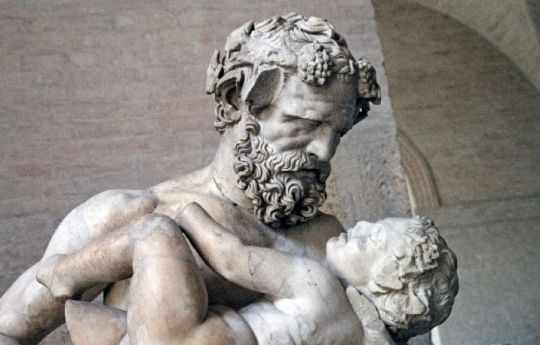
Zagreus
In ancient Greek mythology, Zagreus is a god closely associated with the wine god Dionysus, the underworld, and hunting. A son of Zeus and Persephone, he is known in the Orphic tradition as the first incarnation of Dionysus, whilst other stories identify him as the son of Hades or even as Hades himself.
The earliest mention of Zagreus comes from a quoted line from the lost Greek epic Alcmeonis, a poem dating back to at least the 6th century BCE, where he is described alongside Gaia, the Greek personification of the earth, as "highest of all the gods" (West, 61). Yet some scholars believe this line was only in reference to him being the highest of all the gods of the underworld, as surviving fragments of works written by the Greek tragedy playwright Aeschylus (c. 525 to c. 456 BCE) identify him closely with Hades.
Zagreus is also the name often given to Orphic Dionysus, whose story was central to the beliefs of the followers of Orphism. In the story, Zagreus, a child of Zeus and Persephone, was killed and eaten by the Titans, except for his heart which was found by Athena and brought to Zeus. Because his heart was saved, Zagreus was able to be reincarnated as the god Dionysus. Zeus punished the Titans for their treachery by destroying them with a thunderbolt, and it was from their ashes that humanity was born.
Followers of Orphism, therefore, believed that humanity had a dual nature, one of the body, inherited from the Titans, and one of the soul, or the divine spark inherited from the parts of Zagreus ingested by the Titans. It was the central focus of Orphism for one to achieve salvation through acts of atonement during their lifetime or else be cursed with endless reincarnation. Aspects of Orphism, including the suffering, death, and resurrection of Dionysus Zagreus, and the idea of redemption for an original sin call to mind aspects of later religions, such as Christianity.
Origins & Interpretations
What little is known of Zagreus outside his association with Dionysus comes from fragments of lost works of Greek literature. He was certainly renowned, as a surviving quote from the lost Greek epic Alcmeonis offers a prayer to "Mistress Earth, and Zagreus highest of all the gods" (West, 61). The invocation of his name alongside Mother Earth seems to suggest that Zagreus was held in high esteem and was thought to be very powerful. Some scholars believe that the reference to him as "highest of all the gods" does not claim that he was the greatest god on Mount Olympus, but rather that he was the greatest god of the underworld.
This can be gathered from the context of the prayer, in which the hero of the Alcmeonis, Alcmaon, calls upon the powers of the earth to see the soul of his father safely transferred to heaven. Zagreus' status as a god of the underworld can further be attested to by two works written by Aeschylus. One of these references, found in a fragmented line of one of Aeschylus' lost Sisyphus plays dating back to around the 5th century BCE, identifies Zagreus as the son of Hades. Another reference, from Aeschylus' Egyptians names Zagreus as Hades himself.
Either way, Zagreus seems to have been a powerful underworld god, earning the epithet "Chthonios," or "the subterranean." As for the associations of him to Dionysus, scholars such as Timothy Gantz have postulated that the separate myths of Zagreus, a son of Hades and Persephone, had over time become merged with the myth of Orphic Dionysus, the son of Zeus and Persephone, so that the name Zagreus came to be associated with both myths.
Continue reading...
157 notes
·
View notes
Note
Alexander Hamilton is depicted as a deeply flawed yet compelling protagonist. To claim that Hamilton “did no wrongs” would be an oversimplification, but in the broader context of his life story and motivations, his actions and choices reflect the complexity of human nature. He is not meant to be a perfect hero. Instead, Hamilton is a well-written, flawed protagonist who personifies ambition, trauma, and survival. The tendency to criticize him for not being morally impeccable misses the point of his character arc. In reality, his flaws are what make him relatable and human, and they highlight the larger message of the musical: the struggle for legacy, identity, and self-worth in an unforgiving world. To expect Hamilton to be a flawless, ideal figure is to misunderstand both the character and the human experience.
From the first song, the audience is introduced to a man who has survived more hardship than most can imagine. Orphaned at a young age, growing up in poverty, and facing constant instability, Alexander Hamilton was forced to fight for his survival from the very beginning. His determination to rise above his circumstances is a central theme in both his life and the musical. Miranda's version of Hamilton makes it clear that his ambition was not born of simple greed or arrogance but of a deep-rooted fear of being forgotten or left behind. This makes his drive to achieve understandable, even when it leads him down darker paths.
It is easy for critics to say, “well, he didn’t have to write The Reynolds Pamphlet,” or “he didn’t have to antagonize people like Jefferson and Burr,” but these moments stem from a deeper, almost primal need to secure his place in history. For someone who grew up with nothing, the idea of losing everything he built would have been unbearable. Basic empathy requires us to understand that Hamilton's decisions were influenced by his traumas. No one who has lived through what he did would come out unscathed or free from flaws.
One of the greatest disservices people do when discussing Alexander Hamilton is expecting him to fit the mold of a “perfect protagonist.” We live in a world where audiences are conditioned to look for heroes who are morally upstanding, never make mistakes, and always choose the right path. but life—and great storytelling—doesn’t work that way. Characters like Eliza, who retain their strength and grace despite enduring immense loss, are inspiring, but they are not the only valid models of heroism. Not every person who suffers will react with unshakeable composure or selflessness. Hamilton's flaws make him more real, more complex, and more interesting. They reflect the reality that people, especially those who experience trauma, are not always equipped to handle their emotions or decisions in ways that fit neat moral binaries.
Hamilton's recklessness, pride, and ambition make him both admirable and infuriating. He rises to greatness through sheer force of will, but that same will sometimes leads him to self-destructive choices. His need to defend his legacy (whether by writing The Reynolds Pamphlet or by relentlessly opposing political enemies) comes from a deeply personal place. He isn’t a perfect leader or a perfect family man, but that imperfection is what makes his story so compelling. To fault him for not being more like Eliza, or even more like George Washington, is to impose an unrealistic standard on a character who was never meant to be idealized.
It's fine to critique Hamilton's actions—we should critique all characters’ actions—but what many critics miss is the essential empathy required to fully understand Hamilton's motivations. His decisions, especially the ones that seem irrational or destructive, are the result of years of hardship, insecurity, and an overwhelming need to prove his worth. Writing The Reynolds Pamphlet, for instance, was a terrible decision on the surface, but it came from a place of desperation. Hamilton believed that by confessing his own sins, he could preserve his political legacy. For someone whose entire identity was wrapped up in being remembered, that seemed like the only choice.
Moreover, holding Hamilton to the standard of someone like Eliza—who, as people often note, endured immense personal loss with dignity—ignores the fact that not everyone reacts to trauma in the same way. Eliza's strength doesn’t invalidate Hamilton's struggles. His mistakes and vulnerabilities make him a more fully fleshed-out character, and while we may not agree with everything he did, we can understand why he did it. His life was a constant fight against oblivion, and he chose to make himself known, even if it meant sacrificing personal relationships or making enemies.
What makes Alexander Hamilton a great protagonist is not that he is morally perfect but that he is deeply, unapologetically human. Characters like Hamilton show us that imperfection and complexity are what make for good storytelling. If Hamilton were a flawless hero, always making the “right” choice and never stumbling, his story wouldn’t resonate as deeply. His ambition is both his greatest strength and his fatal flaw, and this makes him relatable to anyone who has ever strived for something and paid the price.
By the end of the musical, Hamilton's legacy is defined by both his achievements and his mistakes. He revolutionized American politics, laid the foundations for the country’s financial system, and fought for the principles he believed in. At the same time, his impulsiveness and need for validation led him into unnecessary conflicts and ultimately cost him his life. These contradictions make him a well-rounded, unforgettable character, and his flaws are what drive his story forward. to ask for anything more would be to erase the richness of his character.
Alexander Hamilton was not perfect, but he wasn’t meant to be. Miranda's version of Hamilton is a reflection of the complexities of human ambition, trauma, and survival. To dismiss him because of his mistakes or to judge him by unrealistic standards of perfection is to ignore the essence of his character. Hamilton's flaws are what make him great—they are the cracks in his armor that allow us to see the full depth of his personality and his struggles.
To truly appreciate Hamilton, both as a person and as a character in the musical, we must recognize that perfection is not the point. He was a deeply flawed protagonist, but one whose story resonates because it is grounded in the reality of human existence.
-alexander hamilton defense anon
.
#hamilton confessions#hamilton#hamilton fandom#hamilton musical#hamilton the musical#alexander hamilton#c.alexander hamilton
38 notes
·
View notes
Text
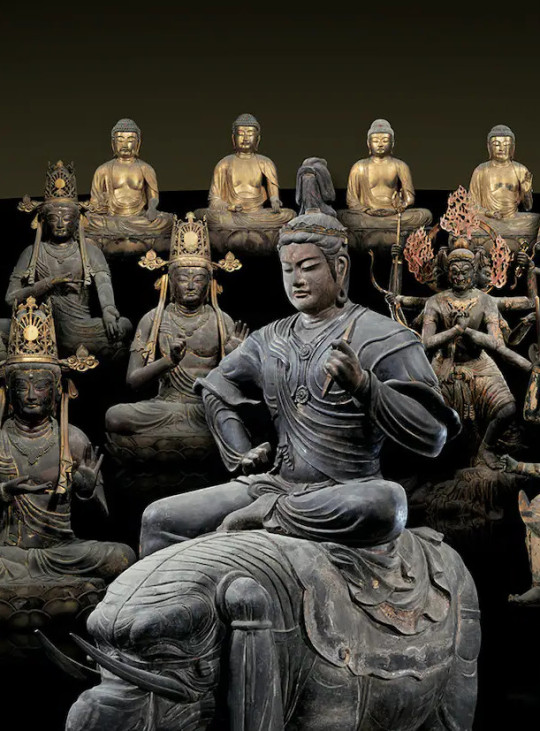
Buddha to his disciples, mini-series (20)
Samsara (Reincarnation)
“When something disappears, something is born. In Buddhism, life and death are the same thing.”
“Samsara” is a Pali & Sanskrit word that literally means "wandering through, flowing on", wherein the term connotes "cyclic change" or, less formally, "running around in circles." It is therefore also translated as 'reincarnation'.
Ancient Indians believed in reincarnation, or rather took it for granted. Therefore, the Buddha also thought it was natural and taught on the premise of reincarnation. And the purpose of the Buddha's teaching is for us to escape from this world of samsara (namely, liberation/enlightenment: Ref).
There are six realms of samsara as conceived by the ancient Indians. They are listed in order of increasing suffering as follows:
World of Hell (naraka), the world of the most suffering. Hell means 'underground prison'.
World of hungry ghosts (preta), a world suffering from hunger pangs. Becomes a demon with a swollen belly. A world where those who have committed the sin of greed are reborn.
World of animals (tiryagyoni), including birds, beasts, fish and insects. There are about 3.4 billion species.
World of warlike demigods (asura), Asura is a demonic species. A world where asuras live and fight all the time, causing constant suffering and anger.
World of human beings (manushya), in which human beings live. It is plagued by the fundamental sufferings, the four and eight afflictions, which are unavoidable in human life.
World of gods or celestial beings (deva), Heavenly beings can fly, and the world is full of pleasures, but here too there is the suffering of old age and death.
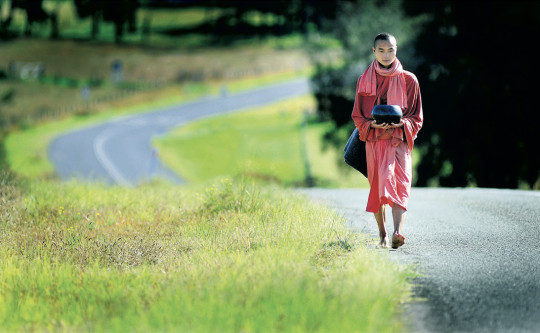
ブッダから弟子たちへ、ミニシリーズ (20)
輪廻 〜 “何かが無くなれば、何かが生まれる。仏教では生と死は同じものである。”
“輪廻”はサンスクリット語で「サンサーラ」という。この語の本来の意味は「さまよう、流れる」を意味し、生あるものが無限の生死を繰り返すことを指す言葉だ。よって、”輪廻転生”とも訳される。
古代のインド人は、誰もが輪廻転生を信じていた、というよりは、それがあたりまえだと思っていたのだ。よって、釈迦もそれが当たり前だと思い、輪廻を前提にして教えを説いている。そして、釈迦の教えは、われわれがこの輪廻転生の世界から脱出すること(すなわち解脱:参照)が目的である。
古代インド人が考えた輪廻の世界は六つだ。以下、苦しみの多い順に並べる:
地獄界〜最も苦しみの多い世界。地獄とは「地下の牢獄」の意。
餓鬼界〜飢えの苦しみに悩む世界。腹が膨れた姿の鬼になる。慳貪の罪を犯した人が再生する世界。
畜生界〜畜生界は鳥・獣・魚・虫など畜生の世界。種類は約34億種。
修羅界〜修羅は阿修羅といい、魔類。阿修羅が住み、終始戦い争うために苦しみと怒りが絶えない世界。
人間界〜人間が住む世界。人間が生きている上で避けては通れない、根源的な苦、四苦八苦に悩まされる。
天上界〜天人は空を飛ぶことができ、快楽の多い世界だが、ここにも老・死の苦しみがある。
147 notes
·
View notes
Note
Why do you worship your god YHWH as the only one? This is a legitimate question? What good does it do for you? Everything your god has done for you shouldn't have anything to do with his status, or uniqueness. I've seen the power of gods alien to your own, from Hel (the goddess I'm closest to, though I do worship others), I've seen her stop animals from moving, protect the sick and wounded, and cause a blind preacher to see her and flee. And I've felt her love, felt her comfort (I probably wouldn't even identify as agender if it wasn't for her help). But because she is not your god you would call this demonic? And say my soul is bound for damnation? Why not admit the existence of other gods, and keep to your own if you wish. How can your relationship with your god even be safe if you can't leave for another? How can it be called anything but bigotry to deny another god's divinity while you worship one yourself?
If that is how you define bigotry and foolishness, let it be known to the world that I am a bigot and a fool.
You ask of me a betrayal of the Lord, God of gods. The demons may have shown you trifles, but there is no other more powerful than God. What kind of god would condescend from the Heavens to dwell among men, to take on our lowly flesh, to take on our sins, to die for us? He is Christ who suffered for us, who was borne of a virgin for us, who was crucified and rose from the dead for us.
God became man so that man might become god!
He united our feeble human nature with His divinity.
The demons serve themselves. They lure you in to worship them because they know they are going to eternal fire, and they know that those who follow God’s commandments will find peace and everlasting life. They envy you who has been given free will and a chance to be with God. They wish to make you a slave to the passions, like them who have been made slaves by their pride.
God asks of His followers: You shall express adoration to the Lord your God, and to Him only shall you offer divine service.
You were given life not just to live, go to school, go to work, retire, and then die. You were given life to see the Giver of Life Himself and He knocks on your door and calls you to repentance.
And who are we?
A man’s life is like grass, and yet God loves us.
Taste and see that the Lord is good; blessed is the one who takes refuge in Him.
34 notes
·
View notes